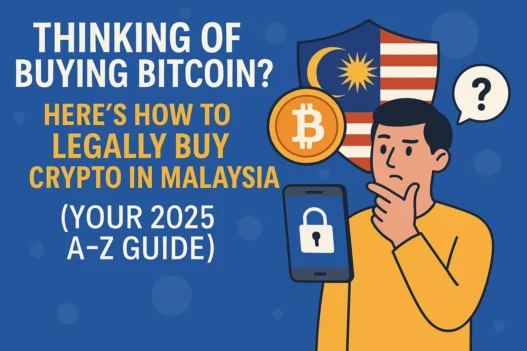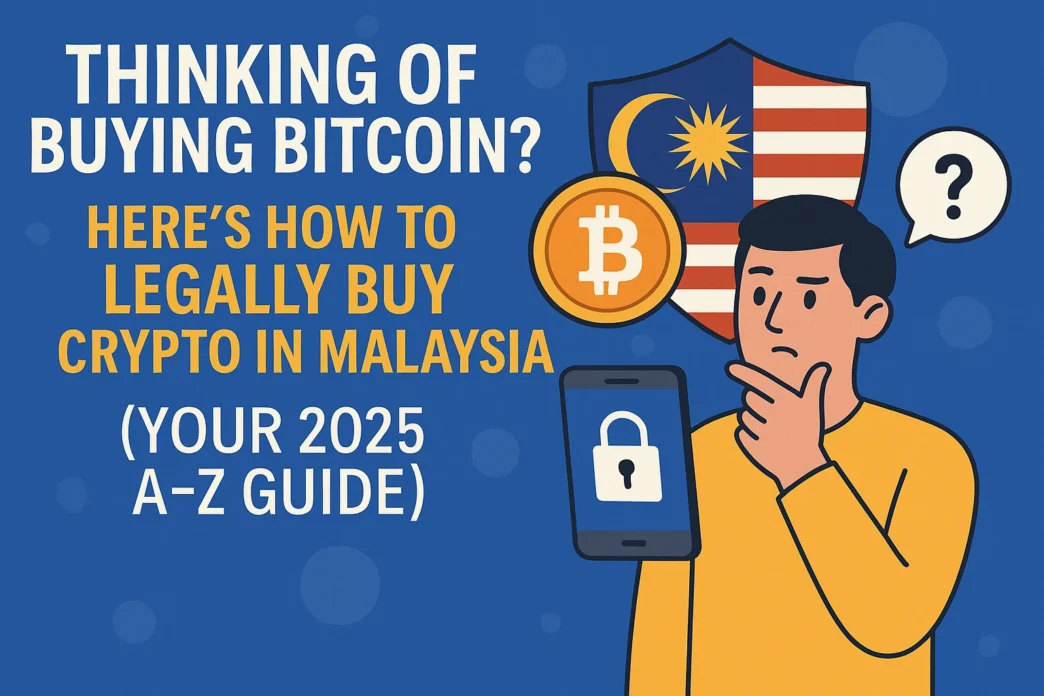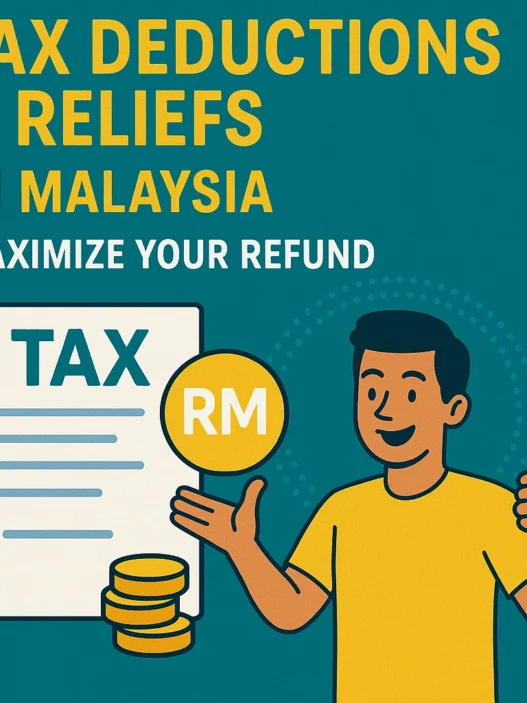Eh, friends! Ever feel like everyone around you is buzzing about Bitcoin, Ethereum, and all sorts of other cryptocurrencies? Maybe you’ve heard stories of folks making some serious money, or perhaps you’re just plain curious about this whole digital currency wave. With the cost of living making us all feel a bit macam tu lah these days, many Malaysians are on the lookout for new ways to grow their wealth, and crypto often pops up in conversation.
But, when we talk crypto, the big questions always surface: “Is this even legal in Malaysia?” “How do I actually buy it?” “Is it easy to get scammed, ah?” Don’t you worry! You’re definitely not alone in wondering all this. The fantastic news is, yes, you can legally buy Bitcoin and other cryptocurrencies in Malaysia. This guide is your new best friend, here to walk you through exactly how to do it safely and correctly, so you can dive into this exciting world with peace of mind. Think of this as your friendly, Malaysian-style map to navigating the crypto landscape!
Understanding Malaysia’s Crypto Legal Scene: What You Absolutely Need to Know
First things first, let’s clear up the legal stuff, ya? In Malaysia, cryptocurrencies are legal to own and trade. But here’s a super important point: they are NOT recognized as legal tender. What this means is you can’t use your Bitcoin to pay for your nasi lemak at Mak Jah’s stall, because only the Malaysian Ringgit (RM) is the official currency here.
Instead, Malaysia views most cryptocurrencies as securities or digital assets. This means they fall under the regulation of the Securities Commission Malaysia (SC). Since way back in 2019, the SC rolled out regulations to oversee the offering and trading of digital currencies and tokens. This ensures that crypto exchanges operate within a proper legal framework.
The Securities Commission (SC) is the main boss (when it comes to) crypto trading. Any platform wanting to run a crypto exchange (officially called a Digital Asset Exchange, or DAX) in Malaysia MUST get approval and register with the SC. As of early 2024 (always double-check the SC’s website for the latest list!), the SC has licensed a few exchanges to operate in the country: Luno, Tokenize, MX Global, SINEGY, HATA, and Torum. These platforms went through a super strict approval process and have to follow tough rules – for example, they must have an independent trustee or custodian to safeguard investors’ funds, implement strong security measures, and comply with anti-money laundering laws.
Using an SC-licensed exchange gives you legal protection under Malaysian law. On the flip side, unlicensed exchanges are illegal to operate locally; the SC has ordered those that didn’t register to cease operations. If you use an unregistered platform, you won’t have any protection under Malaysian securities laws if something goes kaput.
“Investing in crypto in Malaysia is perfectly legal, but you gotta use the right channels lah – stick to SC-approved platforms only!”
It’s also crucial to remember that Bank Negara Malaysia (BNM) does not recognize crypto as a payment instrument. This doesn’t make owning or trading crypto illegal – it just means crypto isn’t “money” in the eyes of the law. You’re free to buy, sell, and hold digital assets as investments, as long as you stick to the regulations we just talked about.
SC-Approved Cryptocurrency Exchanges in Malaysia: Your Go-To Options
Let’s get to know some of the major SC-licensed crypto exchanges you can use here in Malaysia:
- Luno: One of the very first exchanges approved in Malaysia and super popular with beginners. Luno has a simple, user-friendly app that lets you buy/sell crypto using Malaysian Ringgit (MYR). It supports a good range of top cryptocurrencies like Bitcoin, Ethereum, XRP, Litecoin, and many others. Luno is well-known for its easy-to-use interface and solid security track record. Fees are reasonable, and it’s a well-established global company (founded in 2013).
- Tokenize: A Malaysian-incorporated exchange (Tokenize Technology (M) Sdn Bhd, founded in 2018). Tokenize is also SC-regulated and provides a secure platform for trading. It supports a selection of major cryptos (BTC, ETH, XRP, LTC, BCH, UNI, SOL as of this writing). Tokenize’s interface caters to both newbies and seasoned traders, and they often run local promotions. Notably, Tokenize boasts zero fees on MYR deposits and withdrawals, and uses a tiered trading fee structure.
- MX Global: A homegrown exchange (established in 2018) that is SC licensed. MX Global supports trading for a few top coins (e.g., BTC, ETH, XRP, SOL, WLD). It’s a smaller platform but is backed by reputable investors and even received an investment from Binance in 2022, which boosted its liquidity. MX Global focuses on simplicity and security, with features like mandatory two-factor authentication. Like the others, MYR deposits are free, and trading fees are competitive.
(Other SC-approved platforms include SINEGY (a Penang-based exchange focusing on BTC/ETH), HATA (a newer digital broker exchange), and Torum. For this guide, we’ll focus on Luno, Tokenize, and MX Global, as these are popular and beginner-friendly.)
The fact that each of these exchanges is SC-approved means they are legal and safe choices. Now, let’s walk through how to register and buy crypto using these platforms.
“Choosing an SC-licensed exchange isn’t just about ticking boxes; it’s about protecting your hard-earned Ringgit, you know!”
Step-by-Step: How to Buy Crypto on a Licensed Malaysian Exchange
Buying Bitcoin or other cryptocurrencies through a regulated Malaysian exchange is actually quite straightforward. Here’s a step-by-step guide that generally applies to platforms like Luno, Tokenize, and MX Global:
- Sign Up for an Account: Head over to the official website or download the mobile app of your chosen exchange (e.g., Luno’s app or website). Register with your email address and create a strong, secure password. Make sure you’re on the official site/app (check the URL or publisher carefully!) to avoid those sneaky phishing sites. During sign-up, you’ll typically have to agree to the exchange’s terms and conditions.
- Verify Your Identity (KYC): Because these are regulated platforms, you MUST complete KYC (Know Your Customer) verification before you can deposit or trade. This usually involves providing your IC (MyKad) or passport details, a selfie photo, and some personal info (full name, address, etc.). The exchange will have an in-app or online form to upload photos of your ID and a selfie. This process is required by law (to comply with anti-money laundering rules) and ensures only legitimate users access the platform. Verification is usually pretty quick – often within minutes or a day – if your documents are clear. Once approved, your account status will show as “Verified,” and you can then access all features. Easy peasy, just like signing up for other online services!
- Deposit Malaysian Ringgit (MYR) into Your Account: After KYC, you’ll need to fund your account with our local currency. All SC-approved exchanges support online bank transfers in MYR. Typically, you have two main methods:
- Instant FPX Bank Transfer: This is the most convenient option. FPX is an online banking gateway that links most Malaysian banks (Maybank, CIMB, Public Bank, you name it!). In your exchange app, look for “Deposit” or “Add Funds” and choose FPX/bank transfer. You’ll be prompted to select your bank and log in to your online banking to authorize the transfer. The funds are usually credited instantly or within minutes to your exchange wallet. Most platforms charge no fee for MYR deposits via FPX (Luno and Tokenize both offer free instant deposits; Luno only adds a RM1 fee if you deposit less than RM100). For example, depositing RM500 from Maybank via FPX will give you RM500 in your exchange balance.Manual Bank Transfer (Wire/IBG): Some exchanges (like Tokenize and MX Global) also allow manual bank-ins. This means you transfer money to the exchange’s bank account (via your online banking or ATM) using a provided reference code. After you send the money, you’ll need to upload the receipt or wait for the exchange to verify it. This can take a few hours during working hours. Manual transfers are also typically free of fees from the exchange’s side (though it’s slower than FPX).
- Buy Cryptocurrency: With your MYR balance now loaded, you can purchase Bitcoin or other coins. Exchanges usually offer two interfaces:
- Instant Buy/Sell: All three exchanges (Luno, Tokenize, MX) provide a simple way to instantly convert your MYR to crypto at the current market rate. For example, in Luno, you can click “Buy,” select Bitcoin, and enter how much Ringgit you want to spend or how much BTC you want to acquire. The app will show you the price, and you confirm the purchase. This is super easy for beginners. Do note that the fee for an instant buy is usually a bit higher – e.g., Luno charges about 2% for instant buys. It’s the price you pay for convenience.Trading Platform (Order Book): Alternatively, you can use the exchange’s trading interface to place an order. This looks a bit like a stock trading screen with order books and charts. Here you can set a limit order to bid at a specific price, or execute a market order to buy at the current best price. The benefit of using the trading interface is lower fees. For instance, if you place a “maker” limit order on Luno or Tokenize, your fee might be around 0.1%–0.25%, which is much cheaper than the instant buy fee. However, it’s slightly more complex for newbies. If you’re just starting out, it’s perfectly fine to use the instant buy – just be aware of the fee. As you get more comfortable, you can explore the exchange/trading view to save on fees.
- (Optional) Withdraw Crypto to Your Own Wallet: If your goal is long-term investment (“HODLing” as the cool kids say), you might want to transfer your coins to a personal wallet for safekeeping. You are not required to do this – you can leave your crypto on the exchange, especially if you plan to trade frequently or sell it later. However, for better control and security, many users move their crypto to personal wallets (we’ll discuss storage and security in a section below). To withdraw, you’d go to the withdrawal/transfer section of the exchange, enter your personal wallet’s address, and confirm. Do note that withdrawing crypto may incur a network fee (e.g., Bitcoin network fee) which the exchange will either pass on or charge a small amount for. Tokenize, for instance, doesn’t add any extra withdrawal fee besides the blockchain network fee. For beginners, you can skip this step until you learn more about wallets; it’s okay to keep small amounts on the exchange for convenience.
- (Optional) Withdraw MYR (Cash Out): Conversely, if you later sell your crypto on the exchange and want to withdraw your profits back to your bank account, all these platforms allow that. You’d use the “Withdraw MYR” function, enter your bank details (the account must belong to you), and specify the amount. The money will be transferred to your bank, usually either instantly or within the same day (depending on cut-off times). Withdrawal fees for MYR are minimal – typically RM0.10 per withdrawal on Luno and MX Global, and free on Tokenize. So, cashing out is straightforward when you decide to take your profits.
By following these steps, you can go from zero to owning Bitcoin (or other approved crypto) quite easily. Each exchange’s app will guide you through these processes with on-screen instructions as well. When in doubt, check the exchange’s Help/FAQ section – they often have step-by-step tutorials specific to their platform.
“From zero to crypto owner in Malaysia? Easier than you think, as long as you follow the regulated path, step-by-step. Almost like making instant noodles, but hopefully with better returns!”
Using Crypto.com in Malaysia (It’s Regulated by MAS Singapore, FYI)
Aside from the Malaysia-licensed exchanges, you might have heard of Crypto.com, a popular global crypto platform. Now, Crypto.com is NOT licensed by the SC in Malaysia, but it is regulated in Singapore (it received a Major Payment Institution license from the Monetary Authority of Singapore, MAS). This means Crypto.com meets Singapore’s regulatory standards for digital asset services. Malaysian users can legally use Crypto.com, but you should understand the implications:
- Legality and Access: It is not illegal for a Malaysian to use Crypto.com. The SC’s regulations mainly restrict companies from operating unlicensed exchanges in Malaysia; they don’t criminalize individuals using overseas services. Crypto.com’s app is available in over 100 countries, and Malaysia is within its supported regions. Many Malaysians use Crypto.com without issue. However, because Crypto.com is not supervised by the SC, you won’t have Malaysian investor protection. Essentially, you’re relying on Crypto.com’s overseas licenses and reputation. The good news is that Crypto.com is a large, well-known company with various global licenses and a generally strong security record.
- How to Use Crypto.com: The platform is primarily app-based. You download the Crypto.com app, register, and go through a similar KYC process (using your ID and a selfie). Once set up, you can buy crypto with a credit or debit card, or via bank transfer. Note that Crypto.com does not support direct MYR deposits at the moment. Instead, Malaysian users typically do one of the following:
- Card Purchase: The simplest method is to link your Visa/MasterCard and purchase crypto directly. The app will charge your card in your local currency (it will show you the MYR amount). Be aware of fees: Crypto.com usually offers a 0% fee for your first 30 days of card purchases, but after that, there’s about a 3% fee per card transaction.
- Bank Transfer (USD account via SWIFT): Crypto.com allows users from Malaysia to open a USD fiat wallet via SWIFT. This means you could send USD from your Malaysian bank (which would involve foreign exchange and SWIFT fees) to fund your Crypto.com USD wallet, then trade in USD. This option is usually less convenient due to bank charges and slower transfer times.
- Crypto.com Visa Card: One popular feature is Crypto.com’s prepaid Visa debit card. Malaysian users are eligible for the Crypto.com Visa Card. This card lets you spend your cryptocurrency in real life – when you swipe the card or use it online, Crypto.com will automatically convert your crypto into the local currency (MYR) to pay the merchant. It works like any Visa debit card, except your spending balance comes from your crypto holdings. Cool, right? You could treat your friends to teh tarik using your crypto gains!
- Fees and Coins: Crypto.com offers hundreds of cryptocurrencies (far more than the ~19 approved on Malaysian exchanges). If you’re looking for a coin that isn’t available on Luno/Tokenize/MX, you might find it on Crypto.com. Trading fees on Crypto.com’s exchange are similar to local exchanges.
Important: While Crypto.com is a reputable platform, always exercise caution. Since it’s not under SC oversight, any disputes would be subject to Singapore/international regulations. Also, using foreign platforms means you might not have recourse to Malaysian authorities if something goes wrong. Platforms like Binance, while globally popular, are not licensed in Malaysia – in fact, Binance has been on the SC’s Investor Alert list in the past. So, think carefully.
“Venturing beyond local SC-approved exchanges for more coin choices? Sure, can-lah, but remember: more options often mean doing more homework on security and regulations, my friend.”
Clash of the Crypto Titans: Comparing Major Platforms for Malaysians
Here’s a quick comparison of the key platforms we’ve discussed – Luno, Tokenize, MX Global, and Crypto.com – focusing on aspects crucial for you as a beginner:
Luno Malaysia
Regulation:
SC-licensed (Malaysia)
Fees (MYR Deposit / Trading / Withdrawal):
Free (for ≥RM100) / 0.25% maker, 0.5% taker (Exchange); ~2% Instant Buy / RM0.10
Supported Cryptos:
~18 SC-approved coins (BTC, ETH, XRP, LTC, SOL, ADA, etc.)
Ease of Use:
Very beginner-friendly; simple mobile app & web interface
Security Features:
SC-required robust security; 2FA; majority assets in cold storage; independent trustee
Customer Support:
Help Center, Email/ticket support; active on social media
Tokenize Malaysia
Regulation:
SC-licensed (Malaysia)
Fees (MYR Deposit / Trading / Withdrawal):
Free / 0.1% maker, 0.8% taker (plus 8% SST on trading fee) / Free
Supported Cryptos:
~7+ SC-approved coins (BTC, ETH, XRP, LTC, SOL, etc.)
Ease of Use:
User-friendly, interface slightly more advanced; web & app available
Security Features:
SC-regulated with strict compliance; 2FA required; assets with licensed custodian; regular security audits
Customer Support:
Email & web ticket system; responsive during business hours
MX Global
Regulation:
SC-licensed (Malaysia)
Fees (MYR Deposit / Trading / Withdrawal):
Free / 0% maker, 0.5% taker / RM0.10
Supported Cryptos:
~5+ SC-approved coins (BTC, ETH, XRP, SOL, WLD etc.)
Ease of Use:
Simple and straightforward app/website; limited selection keeps it easy for newbies
Security Features:
SC-regulated; compulsory 2FA; standard cybersecurity; funds safeguarded by trustee
Customer Support:
Email support; Help/FAQ pages
Crypto.com (Global)
Regulation:
Licensed by MAS (Singapore) – NOT SC-regulated in MY
Fees (MYR Deposit / Trading / Withdrawal):
No direct MYR deposit; Card purchases ~3% (0% for first 30 days) / ~0.25% maker, ~0.5% taker / International transfer (SWIFT fees may apply)
Supported Cryptos:
250+ coins (vast selection including many altcoins)
Ease of Use:
Feature-rich Crypto.com App, fairly easy for basic buying; can be overwhelming with many products (DeFi, NFTs, etc.) for some
Security Features:
Licensed in multiple jurisdictions; high security (ISO 27001, SOC 2); 2FA; asset insurance (reportedly $750M); no SC oversight though
Customer Support:
24/7 in-app Live Chat support; large online help center
A Note on Fees: All SC-regulated exchanges offer free MYR deposits and very low MYR withdrawal fees. Their trading fees are generally in the 0.25% to 0.5% range. Remember that Service Tax (SST) of 8% is applied to the trading fees on local exchanges (this is usually built into the displayed fee).
A Note on Supported Coins: The SC currently allows about 19 cryptocurrencies to be offered in Malaysia (including all the big names). If you want a coin not on this approved list, you’d have to look at an overseas platform like Crypto.com – but again, this comes with different risks and lack of local SC protection.
“The ‘best’ crypto platform for you, my friend, is the one that clicks with your needs, how much risk you’re comfy with, and how adventurous you feel in this digital gold rush. Choose wisely!”
Keeping Your Crypto Safe & Sound: Storage & Security Must-Dos
Buying crypto is just the first step – next, you need to secure it! Think of it like keeping your physical money safe; you wouldn’t just leave it lying around, right?
- Use Secure Wallets: When you keep crypto on an exchange, you’re trusting the exchange with its custody. For long-term holding (“HODLing”), consider moving your coins to a personal wallet where you control the private keys.
- Hardware Wallets: These are physical devices (like a USB stick, e.g., Ledger, Trezor) that store your coins offline. They are widely considered the safest way to store crypto.
- Software Wallets: These are apps or programs (mobile or desktop) like Trust Wallet or MetaMask. They give you full control, but guard your recovery seed phrase like it’s your life savings! Never share it.
- Enable Two-Factor Authentication (2FA): Always turn on 2FA for your exchange accounts. Use an app like Google Authenticator. This adds a crucial extra layer of security. All SC-regulated exchanges in Malaysia strongly encourage or require 2FA.
- Use Strong, Unique Passwords: Create long, unique passwords for your crypto accounts. Don’t reuse passwords from your email or social media. A password manager can be a lifesaver here.
- Beware of Phishing and Scams: Be super cautious of emails, messages, or websites that look like your exchange but aren’t. Always double-check the URL. Never click login links from suspicious emails – go directly to the official app or type the URL manually. Legitimate exchange support staff will never ask for your password or 2FA codes.
- Withdrawal Safety Features: Many exchanges allow you to whitelist withdrawal addresses, meaning coins can only be sent to pre-approved addresses. This is a great safety net.
- Keep Your Devices Secure: Ensure your phone or computer is free from malware. Keep your apps updated. Avoid using public Wi-Fi for financial transactions, or use a VPN.
By following these practices, you dramatically reduce the risk of losing your crypto. Remember, in the crypto world, you are largely your own bank!
“Your crypto, your responsibility – guard your digital assets like they’re your family jewels, okay? Secure them tight!”
Crypto Taxes in Malaysia: What You Need to Declare (or Not!)
Finally, let’s touch on taxes, because nobody wants trouble with LHDN, kan?
- No Capital Gains Tax (Mostly for Individuals): Good news! For now, Malaysia does not impose capital gains tax on investment profits for individuals, and this generally extends to crypto. If you buy some Bitcoin, hold it, and then sell it for a profit, that gain is typically considered a capital gain and isn’t taxable. For example, if you bought 1 ETH for RM5,000 and sold it later for RM8,000, the RM3,000 profit is usually not taxed as long as it’s a capital investment gain.
- Trading as Income: However, if you are actively trading or running a business involving crypto, the profits can be considered taxable income. The Inland Revenue Board (LHDN) guidelines state that frequent trading can be viewed as revenue-generating, thus making gains taxable. The distinction lies in your intent and frequency:
- If you’re basically a day-trader or flipping crypto regularly for profit, the government sees that as an income-generating activity.
- If you’re a long-term investor who buys and sells infrequently, it’s likely treated as a non-taxable capital gain.
- Mining/Staking Income: Any form of crypto income (beyond capital gains) is generally taxable. This includes crypto earned through mining, staking, airdrops, or as payment for services.
- Keep Good Records: It’s wise to keep records of all your crypto transactions – dates, amounts, values in MYR, and their purpose. This will be essential if you need to calculate taxable profits.
- Reporting: Currently, there isn’t a separate “crypto tax form.” If you have taxable crypto income, you would report it like other income. If you’re just investing personally and not actively trading as a business, you likely don’t need to include capital gains in your tax form. However, when in doubt, it’s best to consult a tax advisor or contact LHDN for guidance.
- Future Developments: The Malaysian government is looking into clearer rules as the crypto industry grows. Keep an eye on official announcements, especially during budget season.
In summary: For most casual investors, you probably won’t owe tax just for buying, holding, or occasionally selling crypto for a profit. But if you’re making a living or significant side-income from frequent crypto trading, you should report those earnings.
“Don’t let crypto taxes spook you! For most Malaysian investors, it’s simpler than you think, but always be prepared and stay informed. When in doubt, ask the experts, lah.”
Conclusion: Start Your Malaysian Crypto Journey Smartly!
And there you have it! Your complete guide to buying Bitcoin and other cryptocurrencies legally and safely in Malaysia. Now you know that it’s not only legal but also accessible through platforms regulated by our own Securities Commission Malaysia. Remember these key takeaways:
- Always use SC-approved platforms like Luno, Tokenize, or MX Global for maximum protection.
- Understand the fees involved before you jump in.
- Practice top-notch cybersecurity to protect your digital assets.
- Be aware of the tax implications based on your investment or trading activities.
The world of crypto is undeniably exciting and full of potential, but just like any investment, it comes with its own set of risks. Start with an amount you’re comfortable potentially losing, always do your own research (DYOR!), and never invest based purely on hype or peer pressure.
We genuinely hope this article has equipped you with the confidence and knowledge to kickstart your crypto journey. Happy investing, and may your trades be ever in your favor!
What’s Your Next Move?
- Explore the Securities Commission Malaysia website for the latest list of approved DAX operators.
- Visit the Luno, Tokenize, or MX Global websites to learn more about what they offer.
- Keep reading more articles on our portal to boost your financial literacy even further!





















